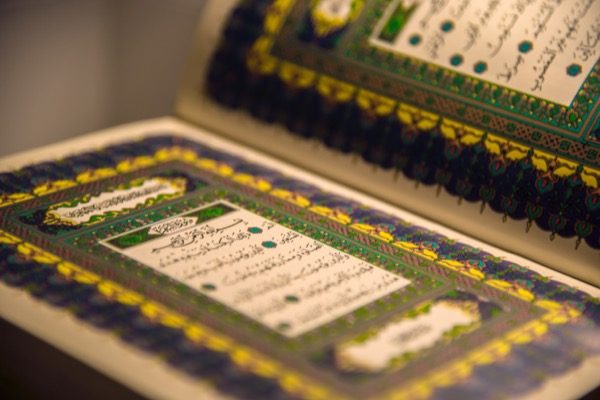
© Shutterstock
In the previous edition, we looked at the reason why the last two chapters of the Holy Qur’an begin with the command ‘seek refuge with God’.
In this edition we further explore the deeper meanings of why Allah used the command ‘Say’ in the beginning of this chapter.
Translated by Murtaza Ahmad
Edited by The Review of Religions Translation Team.
Arrogance also deprives a person from virtue at the beginning [of one’s spiritual journey], that is to say, a person is given a suggestion, he cannot tolerate hearing it. Arrogance is a means of destroying him when he has progressed to the highest stage as well, because one begins to think that he has reached such a stage of spirituality that he no longer needs the help of Allah Almighty. Humāyūn was a famous Emperor of India. Humāyūn was passing through the province of Bihār with a powerful army after having defeated the Afghan Sūrī family in Bengal. Standing on the banks of the river, he observed his army spread far and wide, he uttered the following words:
‘This is such a large army that even if God wanted to destroy it, it would take Him a while too.’
At this time, the Pathan army that he had defeated was slowly pursuing him. They did not do this to get revenge – for they did not have the courage for vengeance – but rather so that if they found any stray soldier here or there from Humāyūn’s army that they could kill him, just as in guerrilla warfare. The gorilla is an ape who attacks while waiting in ambush, and that is why this name is now used to refer to the kind of combat in which one attacks the enemy in an ambush. So they were also stealthily coming towards Humāyūn’s army in this way, but because they had no commander, they were unable to carry out a co-ordinated attack. As soon as Humāyūn had uttered these [above-mentioned] words, an Afghan ruler, Sher Shāh Sūrī, who Humāyūn had taken captive, heard them and was so overcome by honour that he jerked the rope he was bound by with such force that it broke, and he fled to rejoin his Afghan battalion. Because they had needed only a leader, when he arrived, after mutual consultation they launched a sudden ambush during the night on Humāyūn’s army. The result was that the army dispersed in such a manner that it became difficult for the emperor to save himself. As those familiar with history know, to save himself, Humāyūn mounted a horse and plunged into the river. But as the horse reached midstream, it succumbed to exhaustion and drowned. Humāyūn was about to drown when he was rescued by a water-carrier in exchange for the promise of ruling the kingdom for half a day. Thereafter, he was unable to regain control over India and fled to Persia. So whether one succeeds in their secular affairs or their religious ones, one is led to ruin when they become arrogant. Hence why Allah Almighty instructs us to seek refuge at the end of the Holy Qur’an. And it has guided us: ‘Observe! You have studied the Qur’an, understood and pondered over its meanings and have progressed in your spirituality, but do remember that as soon as you deem yourself superior to others and are overtaken by arrogance, then that will be the day of your ruin. Therefore, whenever you start performing any task, religious or secular, always keep God Almighty in mind, and also when completing a task, also keep Him in your mind.’
Moreover, it also appears to contain a prophecy that the Muslims will become arrogant in the latter days as a result of the victories they received from God Almighty, and consequently all kinds of calamities would start to befall them. Thus, they must ensure that they continue reciting Sūrah al-Falaq and Sūrah al-Nās so that Allah Almighty saves them from arrogance and suspicions and doubts of the mind, and protects them against the onslaughts of the enemy.
One subtle point worth bearing in mind is the fact that the word قُلْ [Say] precedes أَعُوذُ [I seek refuge]. Some people, without even reflecting over it first, ask: Why was the word قُلْ [Say] placed here? In other words, according to them, it should have simply been said: أَعُوذُ بِرَبِّ الْفَلَقِ” [I seek refuge in the Lord of Falaq]. And their argument is that if the reader recites قُلْ [Say], it does not generate the same fervour in one’s heart as when one simply recites أَعُوذُ بِرَبِّ الْفَلَقِ [I seek refuge in the Lord of Falaq].
When the late Ḥaḍrat Maulawī ‘Abd al-Karīm al-Siālkotī (ra) recited these chapters in congregational prayers, it is for this reason that he would pause a little after the word قُلْ [Say], and then read أَعُوذُ بِرَبِّ الْفَلَقِ [I seek refuge with the Lord of Falaq].
In many minds the thought arises that the word قُلْ [Say] subdues the fervour and passion that could have been generated without reciting قُلْ [Say]. The truth is that the word قُلْ [Say] does not reduce the reader’s fervour and passion, but rather increases it. This is because the mention of قُلْ [Say] here signifies that this command is also addressed to the Holy Prophet (sa), and in the words أَعُوذُ [I seek refuge] the Holy Prophet (sa) is the first to be commanded [to seek refuge] here, and if أَعُوذُ was present alone without قُلْ [Say], the reader would have thought that the command to seek refuge was directed only to themselves personally, not to the Holy Prophet (sa). And thus when say أَعُوذُ بِرَبِّ الْفَلَقِ, [I seek refuge with the Lord of Falaq], every person would have considered himself the addressee So some people, like as is well known in Punjabi, when they say, ہما تڑاں داکی ہے; in other words, ‘what is the importance and value in our saying I seek refuge?’ However, when Allah Almighty addresses the Holy Prophet Muḥammad (sa) and commanded him to قُلْ [Say] and proclaim to the people that, ‘I seek refuge in the Lord of Falaq despite my attaining the loftiest and most exalted spiritual rank’ – so the members of the Muslim Ummah should better understand the significance of seeking refuge with Allah. Generally, one may think that أَعُوذُ [I seek refuge] is used with reference to people of lower spiritual rank; but by including the word قُلْ [Say], Allah has shown that the Holy Prophet Muhammad (sa) is the first addressee of this command. It is as though the Holy Prophet (sa) is saying, ‘I, too, am not exempt or beyond seeking refuge with Allah; in fact, I, in practice, bow before Allah Almighty by declaring أَعُوذُ [I seek refuge].’ Thus, adding قُلْ [Say] here does not reduce one’s passion and fervour but rather increases it, and its significance is highlighted further by the fact that God Almighty has commanded a prophet of God, i.e., the most extraordinary of beings, who is the focal-point of all spiritual excellences, to seek refuge with Him, how much more should others seek refuge with Him?
Another question that may arise here is that أَعُوذُ [I seek refuge] may denote the meaning that ‘O God! I am overcome by Satan due to my weaknesses and shortcomings, so I seek Your refuge. Therefore, I seek Your refuge’. Thus, in light of these meanings, the words أَعُوذُ [I seek refuge] and istighfār [the act of seeking forgiveness from Allah] carry the same meaning. Thus, by reciting أَعُوذُ [I seek refuge] one makes an admission to being sinful and beseeches God Almighty to cover and overlook his faults. Since the Holy Prophetsa is infallible and his Satan had become Muslim, what is the purpose of his seeking refuge with Allah, then? In response to this it should be remembered that if an ordinary person says, ‘I seek refuge with God from Satan, the accursed,’ then clearly he is confessing his sins. As for the Holy Prophet’s (sa) seeking refuge, it cannot be considered in the same context, because he is infallible. This is why Allah began these chapters with قُلْ [Say] to indicate that the Holy Prophet (sa) did not seek refuge with God on account of his sins, but rather in fulfilment of Allah Almighty’s command, so that in the future Satan could not conspire against the Holy Prophet (sa) and his community.
The prophet cares for his followers as a shepherd cares for his flock. Sometimes the shepherd does not care for his own life, rather would place himself into difficulty and trial in an attempt to save his flock. The prophets also act in this same manner, who seek refuge with God Almighty so that the flock entrusted to them may be protected from Satan’s onslaughts, as Satan does not pose a threat to the prophet, but certainly threatens his flock. In short, the prophet seeks refuge in order to avert Satan’s indirect attacks on him, because attacking the prophet’s nation is tantamount to attacking him. Therefore, the Holy Prophet’s (sa) seeking refuge is different from when an ordinary person recites أَعُوذُ [I seek refuge].
Serialisation of Sūrah al-Falaq will continue of the in the next edition.




Add Comment